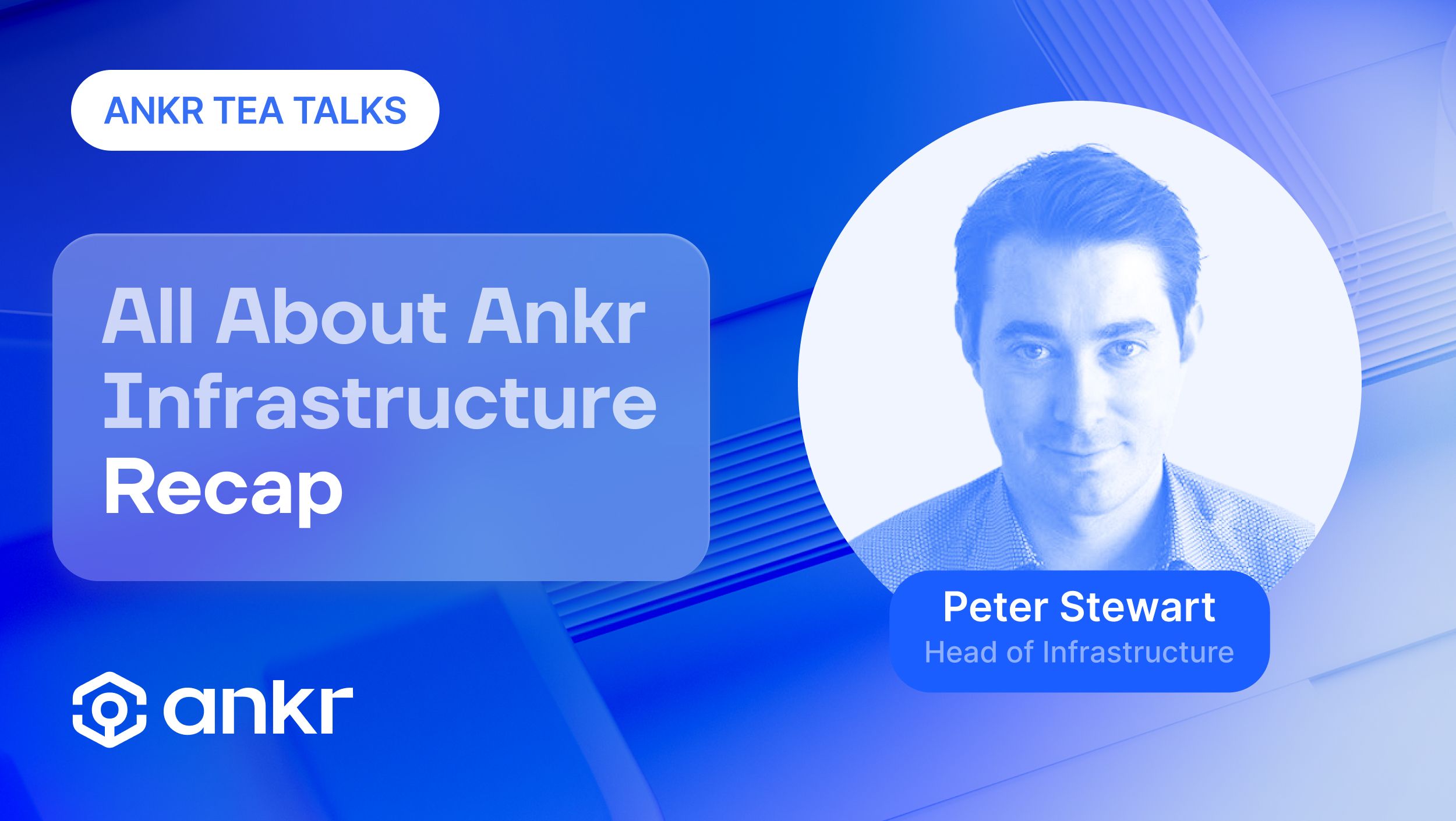Ankr Tea Talk Recap: All About Ankr Infrastructure With Peter

Kevin Dwyer
January 5, 2024
14 min read

In case you missed it, on December 21, Ankr’s Head of Infrastructure Peter Stewart, went live on discord for a Tea Talk session that had the platform buzzing. From running RPC nodes to future developments, Peter had the answers to all your pressing Ankr infra-related questions. But don’t worry! This article dives into the brightest highlights for your reading pleasure.
What does a typical day look like for the Head of Infra at Ankr?
Yeah, well, it's usually a day and a night. Web3 never sleeps. Blockchain never sleeps. And running RPC infrastructure never sleeps either. We do have people spread across the world to manage the node infrastructure and to be able to hand over responsibility from one person to another and respond to alerts.
A typical day is a lot of meetings, whether that's client meetings or team meetings about what's going on. And typically looking after nodes or making sure that other people are looking after nodes and that we’re receiving payments, attention to monitoring, onboarding new customers, integrating new blockchains are all daily tasks. Running RPCs for our enterprise service, which was built within my team from the ground up. Redesigning our load balancer. There's a lot of software development that happens in infrastructure, a lot of monitoring, a lot of QA for validators, AppChains, you name it.
So pretty full day every day and usually for twelve to 16 hours!
How did you find your way to Ankr?
What attracted you to the company's vision?
Yeah, I've been in blockchain and using bitcoin and things since around late 2012. I was running websites and receiving donations in bitcoin back then. Obviously bitcoin was worth $100 back then. I wish I'd saved a lot more of it. That was early. But I dropped out for a while.
My daughter was born and I dropped out of that sort of thing and went and got a serious job, um, building business software for a large German company. But in the meantime, sort. Of around 2017, when Ethereum was taking off I got involved with another project called Horizen.
It was called Zencash back then. And I was running blockchain nodes there and got interested in things like Fantom and so on. I quit my job at, um, the end of 2021 and like two months into retirement. Quote, unquote, I got called up by our previous head of security, who I'd known from the cash community asking if I wanted to come on board and set up or help them with help ankr with PRCs and so on. And as I say, I was already running an RPC business. Just not a business, just a free service that I was doing for Fantom that was kind of in competition with Ankr’s service.
And so I got on board there and yeah, the rest is history, so they say right. Now I've gone from joining as a DevOps to having run the infrastructure team with 20 people working for me in two years. So, we've grown quite a lot.
How many chains does Ankr support?
We run over 100 blockchains, including testnets now. So there's a lot of things happening all the time with RPC nodes. A lot of updates happening now. With Goerli, going away, for example. In January, or going into deprecation. A lot of chains are now launching Sepolia instead.
So there's a lot of work right now to prepare for that. And chains are releasing um, doing forks, uh, or just launching Sepolia. So a lot of setting up of new test nets. I think the numbers are we did something like 23 main nets and plus testnets. Somewhere close to 40 or 50 chains integrated this year. So an average of about one a week which is phenomenal amount. It's a phenomenal effort.
Is it challenging to keep up with the trends in the space like inscriptions?
I got to know inscriptions quite late when they started to basically break chains out there. I do my best to keep track of trends to ensure Ankr’s infrastructure remains cutting edge and good.
I think I'm like everybody else,I follow a bit of crypto news, a bit of crypto Twitter or other channels, Telegram, ect. I mean with inscriptions that was kind of in the news. I mean, ordinals were in the news for a while. And then it started happening on EVM blockchains. And I think even today there's also on Solana as well. And there's a program account on Solana that's trying to do inscriptions or something.
Obviously we have a lot of blockchain clients, so when it happens to them, they tell us when it's happening. Um, so far there hasn't been much. The thing with inscriptions in particular is just that It's not so much that there are RPC nodes.
You can turn off all the RPC stuff and the nodes still don't work particularly well without naming any names. I think that's because all chains, as far as I know, have been affected negatively by it happening to them. But, um, basically when a blockchain says. That it can do 150 or 2000.
TPS, something like inscriptions is actually a pretty good test for whether they can put their money where their mouth is on this stuff. And so far, I would say that. Almost without exception, every blockchain that's been tested so far has failed in one way or another with this.
And we work together as a team to keep up with the latest trends. Blockchain nodes are not hugely complicated things. I mean, there's a consensus engine with a database attached to it. And the database is the thing that we're really interested in from an RPC perspective. And obviously there's a lot of different differences between things.
What blockchains are you used to working with?
There's a lot of clones of Ethereum. Go ethereum, geth, and Avalanche clones and Optimism clones and so on. So there's kind of like broadly speaking. There's a large group that are relatively. Similar and perform similarly. And then there's a whole bunch of other ones that are just completely new and they are sometimes the hardest to support, but they're also the most interesting in terms of learning things about different ideas for how people are setting up blockchains and so on. Obviously we build out chains. So it's interesting to see sort of what the ideas are out there in terms of our technology offerings.
Can you give us a glimpse into the current projects that you are working on?
So we built this new load balancer for the enterprise service. So we built that really from the ground up. There was no leaning on other things. Or copying other people's code and so on. Obviously we use libraries like everybody else.
But we really built that from the ground up in Golang. So the development team had done Sterling f. Actually originally we built it in C Sharp and then we converted. It to Golang and. didn’t have an enterprise service before, so that's been amazing and it's getting better every day.
We're actually reaching a point where we're thinking about moving developers onto other things. And the main thing, and I think anybody who uses Advanced API will agree that there have been some stability problems there. So really we're focusing on making sure that we've had for a while a concept of the Advanced API V2 which allows us to be more modular and more nimble in deployment situations. So we could deploy specific Advanced API modules for individual clients and things like that. We've been heading towards sort of the enterprise arena for the last year or so. Obviously people have seen our partnerships with Microsoft and Tencent and various others as well, Google as well, Alibaba, et cetera, et cetera. So these are all an effort to bring blockchain, Web3 DLT technology to Web2 companies. It’s certainly been interesting to work with those companies.
Also working on a lot of automation projects using new tools and so on to make things more stable and more responsive. So detecting traffic surges and so on. And being able to deploy nodes in. Response to them and so on.
What is the difference between the product team and infra team?
If you think about the kind of the pipeline for Ankr, I think it's pretty standard to any company. We have a sales team that brings in customers or potential customers. The product team has sort of like a dual role.
The product team is there to do some of the heavy lifting, getting requirements for the integration, doing estimations for timeline based upon our pipeline. So doing a bit of pipeline management, coordinating between the different teams. Obviously we have marketing, sales and various other departments.
And on the other side, product is also responsible for moving our products forward. In particular with AppChains, with Advanced API also. Things like app chains or other and efforts that we do. Product really has a role in working out what the product market fit is for those things and who the potential customers could be. Again making sure that things are documented, things are coordinated with marketing et cetera, et cetera.
Is Ankr planning or working on anything related to AI in terms of infrastructure or services?
Are we actively working on things in infrastructure? No. However, we can start to implement AI to improve operations in terms of orchestration and so on. We can improve coordination and detecting when there are increased traffic loads in a particular region around the world for a particular blockchain, deploying more nodes and things like that. Obviously you can do this stuff with algorithms and just write a bunch of code and detect numbers and set ratios and so on. But one of the things that we're going to try and explore next year is utilizing machine learning involved in all of that so that it can recognize patterns tell another machine to go and deploy a node. So we use Nomad, which is a hashicorp product, it's pretty well known and that has the capability that we can just sort of tell it to do things and it will just go off and automate it all.
So, that's something that I would like to get the time to explore next year. We don't have any dedicated machine learning people inside infrastructure right now, but we do have developers who are interested in machine learning. It doesn't all have to be serious and hardcore projects. Sometimes you just need to do a bit of exploration of what the possibilities are.
The other thing obviously would be blockchain data analytics. So, recognizing patterns. Maybe we'll do some sort of information service there in conjunction with Advanced API. So that might come down further down the line. I'm not a huge believer in the conjunction of blockchain and AI, except in the realm of data or orchestration.
So how have the RPC response time improved over the years?
We moved to bare metal before my time, and that gives us the ability to do things at a higher scale. That's why we're number one, number two, number three in most of the blockchains. In terms of the number of RPC calls, that we support obviously Ethereum is the one with the biggest competition in that space. But certainly for Polygon and I think also for BSC, we're number one. In terms of number of RPC calls. And that's kind of history. That's why we do it in terms of response times. The big claim to fame that Ankr has, is that globally, if you average our RPC response time, we're generally number one, number two in most regions. And there's a compare nodes website that you can go and have a look at, which has nothing to do with us, it's just an independent site. And also we're negatively affected by the fact that they do all their testing from cloud, and we're not on cloud.
But you can see that we have globally very good times, and that's because we have 40 data centers worldwide in all continents apart from Antarctica. As a result, we have pretty good latency.
In the future we'll have a big announcement about our version two protocol, which is the thing that everybody connects to when they use the RPC service that goes through Cloudflare. With the enterprise system, the new one that we built, it doesn't get through Cloudflare.
And we can see it's better. In cases 50% better in terms of latency. So certainly the nodes themselves haven't changed. But the method by which we deliver calls and so on has changed with the enterprise system. That's definitely an improvement that's come through recently.
Why is Ankr’s RPC Service the favorite of so many developers?
One of the reasons why I joined Ankr is because the largest proportion of our traffic on Ankr RPC is free, completely free. No obligations, no nothing. Right. And I love that mission because I think that if there are no free RPC services, then blockchain will not flourish. I think that the proliferation of free RPC services from us, from competitors, et cetera, is really one of the driving forces of blockchain adoption. I. E. You can connect your MetaMask. Wallet, you can do your development, et cetera, you don't even pay for it.
So for a small development team, somebody. With an idea, but the coding skills to get involved with blockchain, the. Initial startup cost, the barrier to entry is very low in terms of information or the ability to deploy contracts and things like that. It's all very low cost because a lot of it's free.
Um, and that's part of Ankr’s mission, something, um, that I've carried the torch for after other people started that mission. So yeah, we do improve over time because we get the nodes in the right places. We look at the traffic statistics, see where people are querying for different blockchains, and try and put nodes in those places so that people's experience is better.
How has the activity been on Ankr’s RPC Service as the pulse of Web3 development?
Depending upon the month we could be doing 200 billion calls a month or less. And it's been creating over time a lot more paying customers now than we used to, and that's due to the efforts of the sales team and the product team and so on.
But also I think that we look like we're heading into a bull market – just not financial advice, obviously. Yeah, be aware of that. When there's an uptick in interest in blockchain, then people use more traffic, basically. So that certainly happens in the downtime I always like, it's kind of a cliche now to talk about the winters as being the time for the builders. But that's also true. I mean, certainly we did not suffer from a lack of customers during the crypto winter. Projects are building they were lucky enough to do fundraising rounds, VCs, whatever during the winter or before the winter, then they can use that cash to build things.
And once they've come into the summer again, um, then they're ready to spend that money so they can be integrated for their RPCs and support their developers and so on and so forth. It's very much seasonal with all of these developers on their chains and so on. It's a good job.
You see a lot of happy people in blockchain?
Yeah, definitely. Well I mean, don't mean to continue bragging about it. Well, I guess somehow, yes. When Vitalik visited our booth in Istanbul, I showed him as well what we did, and our Ethereum RPC traffic, the requests that we served in that month, I think we showed the last 30 days, if I remember correctly. I want to believe he was genuinely, impressed and mentioned that, well, it looks quite good and keep out the good work.
What’s happening with the ANKR Token?
We're an American company, we're under American law. And obviously we have to be very careful with the ANKR token. Everything that we want to do with the ANKR token, we have to run it by lawyers to make sure that we're not putting the company in danger with these things and with the SEC. But certainly every single project that we work on, there is at least the consideration of how can we utilize the ANKR token within the ecosystem that we are building or a product that we build, et cetera.
Some are going to be more appropriate than others for the ANKR token usage. But yeah, that question has never gone away with inside ANKR. It's really just that we have to. Be careful about it. Um, So I think that's the safe answer.
It’s always a consideration. Whenever we launch something, whenever we build something, whatever we're doing, we're always thinkingf about how the ANKR token can be integrated into that. And really it's just a question of whether it can be and whether it's appropriate or not. It's not the wild west.
There's a lot of regulation happening right now and there's a lot of companies including ours, that are really unclear. In the US there hasn't really been given much clarity. I mean, you only have to look at the Coinbase issues and so on around this.
Any other closing thoughts, Peter?
I'm just going to say it because people don't do this automatically. We can sometimes solve your problems directly if it's something simple in Discord or Telegram. But really, the best way to get support is to raise a ticket. So helpdesk@ ankr.com is the place.
The advantage for you guys is that it's tracked, and we have KPIs around answering support questions and so on. Certainly, if you're planning to share private information like API keys and things like that. Don't do it on Discord. Yeah, I guess that's my final word.
And thank you to everybody who joined today!
We’re going to do more sessions like this one with more people from the product team as well. As Peter mentioned, he can always grab someone and force him or her to join us. And yeah, stay tuned for more exciting updates!
Until next time.
Join the Conversation on Ankr’s Channels
Twitter | Telegram Announcements | Telegram English Chat | Help Desk | Discord | YouTube | LinkedIn | Instagram | Ankr Staking



